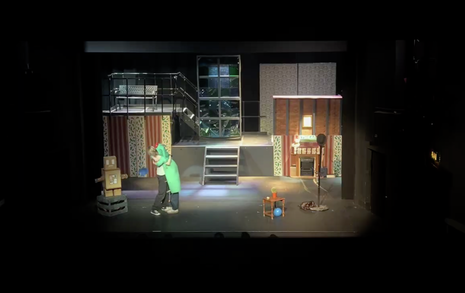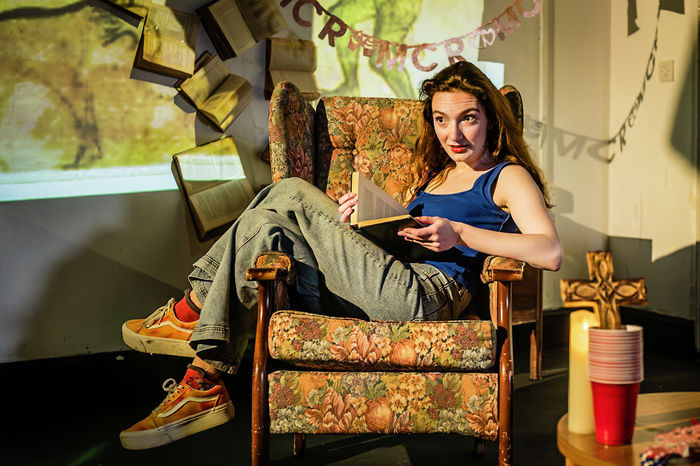Comedy in crisis: Half-Baked doesn’t quite rise
Leon Rake finds Half-Baked rich in effort but short on substance, a one-woman show with more fizz than form

There is something inherently admirable about the one-person show. Alone onstage, a performer must conjure an entire world, shifting between characters, moods, and metaphysical epiphanies with nothing but their own voice and presence. In Half-Baked, Footlight Helen Brookes takes up this Sisyphean task with palpable energy and a wardrobe full of wigs and sunglasses. Unfortunately, despite her undeniable stamina, the show feels less like a dynamic sprint and more like a slow amble through a series of uneven sketches that never quite coalesce into a satisfying whole.
The premise is certainly intriguing: Helen, born prematurely (seven months in the womb, twenty years on the planet), decides things have gone ‘a bit pear-shaped’ and embarks on a surreal identity quest. She considers becoming everything from a cowboy to a rom-com heroine to an inanimate rock – each transformation more absurd than the last. And there’s a distinct charm to the sheer theatrical audacity of the play: why shouldn’t one discover oneself by pretending to be a magician named Mr Amigo or the abstract concept of masculinity in a baseball cap?
When the lights come up, Brookes bursts on stage, panting, as if already mid-panic. The audience laughs. It’s a strong opening: energetic, unpredictable, and slightly manic in a way that promises controlled chaos. For a few moments, it delivers. Brookes shapeshifts with impressive ease, adopting accents, attitudes, and entire personas at breakneck speed. There’s a robot dispensing life advice and an actor pretending to be a dog urinating on a rock.
“Brookes shapeshifts with impressive ease, adopting accents, attitudes, and entire personas at breakneck speed”
If this all sounds like a chaotic audition tape for an avant-garde panto, that’s rather how it feels. At some point, I overheard one bemused audience member whisper “What the hell is this? Like freshers mucking about outside Sainsbury’s.” The comparison, while unkind, did strike a certain chord.
The set design, on the other hand, offered a welcome measure of coherence. A modest cactus, a table, and what appeared to be a small home in the background gave the stage a lived-in, slightly surreal quality that could have framed Helen’s identity journey in more meaningful ways. As it stood, she didn’t interact much with the setting, and while I wasn’t convinced it added much to the performance, there was potential there – an atmospheric layer left largely untouched. That said, a different set wouldn’t have altered my perception of the piece as a whole. The shortcomings lay elsewhere.
And yet, I kept hoping the play would pull itself together - find an arc, or at least a rhythm beyond the dizzy parade of skits. Comedy, after all, thrives on pattern and surprise: we laugh because something is both familiar and unexpected. Half-Baked, despite its relentless costume changes and whimsical conceits, rarely surprised. The jokes – often rooted in caricature and silliness – landed with decreasing effect. The early giggles gave way to polite smiles. The hour-long runtime, though modest on paper, began to feel stretched thin. There’s a song cue near the end: ‘See You Again’ by Wiz Khalifa and Charlie Puth. “We’ve come a long way from where we began,” the lyrics intone. By that point, I found myself nodding in weary agreement.
“If Half-Baked is a kind of theatrical experiment, it’s one that needs a little more time in the oven”
Still, it’s important to acknowledge the sheer difficulty of what Brookes attempts here. A solo performer has no one to bounce off, no pauses afforded by scene changes or ensemble dynamics. It’s a tightrope walk without a safety net. That Brookes manages to hold the audience’s attention at all is a testament to her stage presence. There’s no question she’s a talented performer. What’s missing is material that matches her energy with nuance or narrative cohesion.
The show hints at deeper themes – identity, womanhood, the chaotic expectations placed on young people – but these are never explored with the clarity or conviction they deserve. Instead, they’re brushed up against lightly, then buried beneath another layer of irony or zany prop work. The result is a piece that gestures towards emotional depth but seems afraid to linger there. It is as if the protagonist is trying on identities without ever sitting with them long enough to see which might fit.
To her credit, Brookes is clearly having fun. There is a real sense of joyful experimentation, of playing with theatrical form just because she can. That spirit is infectious at times. But comedy, like any art form, needs structure. Without it, even the boldest choices can begin to feel repetitive, like being trapped inside someone else’s inside joke.
I left the theatre with a curious feeling: not quite frustration, not quite disappointment, but something closer to admiration tinged with melancholy. I wanted to like it more. I wanted to be pulled in. But in the end, the play felt too self-aware to be moving, and too meandering to be funny. Still, I’d rather see something overly ambitious than safely dull. Brookes takes a swing here, and there’s courage in that. If Half-Baked is a kind of theatrical experiment, it’s one that needs a little more time in the oven, but it’s certainly got some interesting ingredients.
 News / Right-wing billionaire Peter Thiel gives ‘antichrist’ lecture in Cambridge6 February 2026
News / Right-wing billionaire Peter Thiel gives ‘antichrist’ lecture in Cambridge6 February 2026 Features / From fresher to finalist: how have you evolved at Cambridge?10 February 2026
Features / From fresher to finalist: how have you evolved at Cambridge?10 February 2026 Film & TV / Remembering Rob Reiner 11 February 2026
Film & TV / Remembering Rob Reiner 11 February 2026 News / Churchill plans for new Archives Centre building10 February 2026
News / Churchill plans for new Archives Centre building10 February 2026 News / Epstein contacted Cambridge academics about research funding6 February 2026
News / Epstein contacted Cambridge academics about research funding6 February 2026










